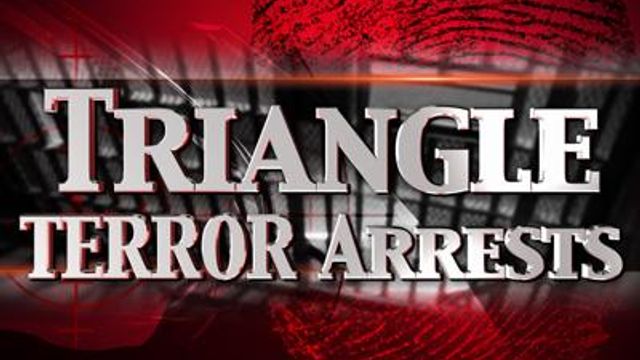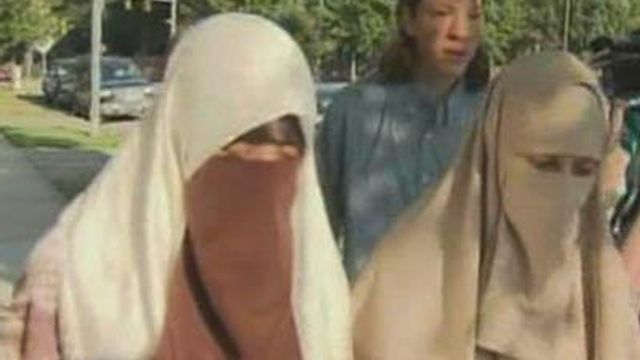Alleged terrorist: 'Allah knows I love jihad'
FBI Special Agent Mike Sutton testified that Daniel Patrick Boyd told a federal informant that he would bring jihad to the U.S. if he was unsuccessful overseas.
Posted — UpdatedFBI Special Agent Mike Sutton testified that Daniel Patrick Boyd told a federal informant that he would bring jihad to the U.S. if he was unsuccessful overseas.
Sutton also said that thousands of rounds of ammunition and thousands of dollars in cash were seized during a search of Boyd's Willow Spring home.
Boyd, 39, was among seven men charged in the case who appeared in federal court in Raleigh on Tuesday for detention hearings. The hearing is expected to continue Wednesday morning.
The seven men – Boyd and his sons, Dylan Boyd, 22, and Zakariya "Zak" Boyd, 20; Hysen Sherifi, 24; Mohammad Omar Aly Hassan, 22; Ziyad Yaghi, 21; and Anes Subasic, 33 – were arrested and charged last week with plotting to murder, kidnap, maim and injure people overseas.
An eighth suspect, Jude Kenan Mohammad, 20, of Wake County, is believed to be in Pakistan. Prosecutors have said they hope to have him in custody soon.
Prosecutors played scratchy recordings in court Tuesday of Daniel Boyd talking to family members and others about waging jihad on non-Muslims. He said he wanted to retake land in Algeria and collect "stolen wealth," according to the recordings.
"Allah knows I love jihad," he is heard saying in one recording.
Boyd also talked in the taped conversations about training with armor-piercing weapons, traveling overseas and robbing banks and armored cars.
Kieran Shanahan, a former federal prosecutor who attended the hearing, called the recordings "chilling."
"It was a very chilling experience to hear their own voices talking about jihad," Shanahan told WRAL News. "They are talking about doing violent jihad, not only abroad but here in the United States.
Hearing attracted overflow crowd
Dozens of people gathered at the courthouse to support the accused men, saying government charges against them are unfounded. About 50 people had to stand in the hallway outside the courtroom because every seat inside was filled.
"To know Daniel Boyd like we do and his family, there's just no way he's a terrorist how the media's portraying him," family friend Carol Abeuomar said.
"My son is innocent. This is just a setup," Yaghi's mother said.
She waved to her son during the hearing, and Hassan repeatedly glanced back at his fiancee. Zak Boyd mouthed the words "I love you" to his mother, sister and younger brother.
Sabrina Boyd, Daniel Boyd's wife and mother to Dylan and Zak Boyd, declined to comment as she left the courthouse Tuesday evening.
The scene outside the federal courthouse was a mix of tension and meditation.
Bomb-sniffing dogs and Department of Homeland Security agents patrolled outside the courthouse, and heavily armed U.S. marshals ferried the seven defendants from the Wake County Detention Center into and out of a back entrance at the courthouse.
Meanwhile, a group of Muslim men took advantage of the lunch break in the hearing to say their noon prayers on the plaza outside the courthouse.
The allegations of terrorism have created mixed feelings among Muslims in North Carolina.
"We're all stunned. We hope to gain some understanding and see why they've been arrested. We need more of an explanation," said Khalilah Sabra, state director for the Muslim American Society. "What we're trying to do is make sure there is due process. We're not coming to any conclusions about guilt or innocence. Just that justice be done."
Sabra said the case would shed more light on the concept of jihad and how some people interpret it.
"I'm sure a lot of people that knew nothing about the concept will learn a lot about it by the time this trial is over," she said.
Ammo, cash seized from defendant's home
"I should rejoice at the opportunity to punish the kafir," FBI Special Agent Mike Sutton said Boyd told an informant. "Kafir" is an Arabic word commonly translated as "unbeliever," or someone who is not a follower of Islam.
Sutton said 27,443 rounds of ammunition were taken from the Boyds' home and Daniel Boyd's truck. A backpack in the truck contained a vest with numerous 30-round magazines.
Photos presented during the hearing showed fortress-like elements at the home, including a bunker on the back deck, a lookout stand in a tree, a cabinet near the front door filled with weapons, gas masks and a trench under the deck that a witness told authorities was designed to conceal weapons.
Daniel Boyd told FBI agents in a 2004 interview that he had trained at a terrorist camp in Connecticut and that Subasic had gone to a similar camp in Las Vegas, Sutton said.
Sutton said $13,000 in cash also was found at the Boyds' home and that Dylan Boyd had a deposit slip for $16,000 that was dated July 21. Sherifi had $10,000 in cash as well, Sutton said.
One of the allegations against the men was that they were raising money to fund terrorist activities.
Daniel Boyd told the others that they could get cash through checks from credit card companies and wouldn't have to worry about repaying the money because they would be out of the country, according to Sutton.
FBI agents lured the Boyds to a Durham construction site on July 27 under the guise of having them bid on a project, authorities said. Daniel Boyd and his wife owned a drywall business.
As agents took the Boyds into custody, Daniel Boyd reached for a concealed weapon he was carrying legally, Sutton said. Dylan Boyd put his hands up but had to be subdued when he failed to comply with orders from authorities, Sutton said.
Defense attorneys seek to get bonds set
None of the evidence presented Tuesday pointed to a particular target or orchestrated attack. When defense attorneys cross-examined Sutton, he said authorities didn't know of specific targets of the alleged terror plots and said he had no information about any intent to harm people in the U.S.
Hassan's and Subasic's fathers said they would take custody of their sons if they were released from jail. Sherifi's second-cousin did likewise.
Defense attorneys argued that the men's passports have been confiscated, so they cannot flee the country. Sherifi's attorney also said the only reason he planned to travel to Kosovo last month was to visit his pregnant wife.
Prosecutors maintained that all of the men were dangerous, noting that Subasic ordered books and supplies for sniper training and that Hassan and Yaghi had been arrested together twice on assault charges.
Shanahan said the judge would have to determine the role each man is alleged to have played in trying to determine whether any should receive a bond.
"It's a mixed bag with the seven defendants, meaning different levels of culpability," he said.
Electronic surveillance will play a key role in the case, Shanahan said.
The U.S. Attorney's Office already has filed notices that it plans to use evidence gathered through the Foreign Intelligence Surveillance Act against each defendant. FISA sets out how intelligence on foreign agents in the U.S., including suspected terrorists, can be gathered.
Hassan on Monday asked that the government turn over any information it has about him, including any audio or video recordings. His lawyer requested that the government also "disclose whether there has been any electronic surveillance, eavesdropping ... or any similar investigative techniques used in the investigation of this case" and turn over copies of any recordings.
Attorneys for the suspects said Tuesday that their clients are handling the weight of the scrutiny their case has received well.
"He's in good shape. He's holding up well and seems to be well-balanced," said Yaghi's attorney, Douglas McCullough.
Late Tuesday, Subasic's court-appointed attorney and interpreter filed motions to be removed from the case. His attorney blamed existing court obligations and personal matters. The interpreter cited a conflict of interest since she had worked with the Subasic family in the past.
Related Topics
• Credits
Copyright 2024 by Capitol Broadcasting Company. All rights reserved. This material may not be published, broadcast, rewritten or redistributed.






